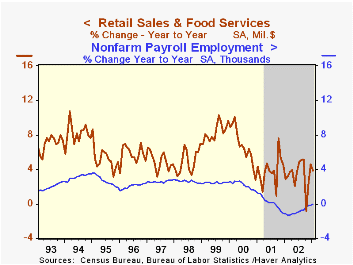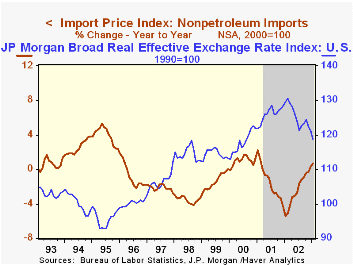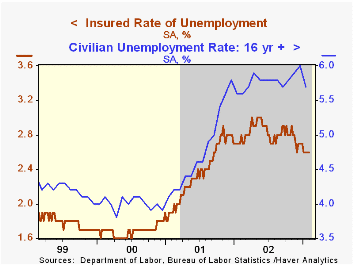 Global| Feb 13 2003
Global| Feb 13 2003Retail Sales Fell, Nonauto Sales Jump
by:Tom Moeller
|in:Economy in Brief
Summary
Retail sales fell more than consensus expectations for a 0.5% decline. Sales in December were revised up slightly. Sales excluding motor vehicles and parts dealers rose much more than Consensus expectations for a 0.4% gain. The gain [...]

Retail sales fell more than consensus expectations for a 0.5% decline. Sales in December were revised up slightly.
Sales excluding motor vehicles and parts dealers rose much more than Consensus expectations for a 0.4% gain. The gain was the strongest monthly increase in nonauto sales since September 2000.
Sales strength centered in higher sales of gasoline (2.7%), building materials (2.9%) and food (2.6%).
Furniture and home furnishing store sales fell 1.4% (-0.2% y/y) following a 0.4% December decline that was revised from an initial estimate of a 0.3% gain. Furniture sales fell a hard 1.3% following a like decline December (revised from unchanged). Sales at electronics and appliance stores fell 1.4% (0.0% y/y).
Sales at general merchandise stores rose a moderate 0.6% (3.5% y/y) following a little-revised 0.4% December gain.
Apparel store sales rose 0.3% (2.0% y/y) following an unrevised 0.8% December increase.Through December, apparel prices in the CPI were down 1.8% y/y.
Motor vehicle dealers' sales fell 7.5% and more than reversed the prior month's gain. Unit sales of light vehicles fell 11.5% last month to 16.21 mil.
| Jan | Dec | Y/Y | 2002 | 2001 | 2000 | |
|---|---|---|---|---|---|---|
| Retail Sales & Food Services | -0.9% | 2.0% | 3.9% | 3.4% | 3.9% | 6.7% |
| Excluding Autos | 1.3% | 0.2% | 4.8% | 3.9% | 3.4% | 7.3% |
by Tom Moeller February 13, 2003

Prices for imported commodities rose quite a bit more than Consensus expectations for a 0.1% gain.
Petroleum import prices rose by the most for any month since April and were up double the strong December gain. This month, the price of West Texas Intermediate crude topped $35.00/bbl. versus $32.94/bbl averaged in January.
Nonpetroleum import prices rose modestly and by the same 0.2% as in December which was revised up. During the last ten years there has been a 60% correlation between the (inverted) level of the US dollar's real exchange rate and the y/y change in nonoil import prices.
Prices of imported capital goods fell for the fifth straight month (-2.1% y/y). Nonauto consumer goods prices rose modestly for the second month but were down 0.5% versus last year. Imported motor vehicle prices fell 0.2% (+0.5% y/y). Imported food prices rose 0.7% and were up a firm 5.3% y/y.
Export prices rose a firm 0.4% led by gains in both agricultural (7.4% y/y) and nonagricultural (1.0% y/y) commodities.
| Import/Export Prices (NSA) | Jan | Dec | Y/Y | 2002 | 2001 | 2000 |
|---|---|---|---|---|---|---|
| Import - All Commodities | 1.5% | 0.6% | 5.5% | -2.5% | -3.5% | 6.5% |
| Petroleum | 12.4% | 6.2% | 68.6% | 3.0% | -17.2% | 66.5% |
| Nonpetroleum | 0.2% | 0.2% | 0.6% | -2.4% | -1.5% | 1.0% |
| Export - All Commodities | 0.4% | -0.2% | 1.5% | -1.0% | -0.8% | 1.6% |
by Tom Moeller February 13, 2003

Initial claims for unemployment insurance fell more than expected last week. Claims fell 4.6% from the prior week's level which was revised up.
The four-week moving average of initial claims rose slightly to 389,000 (-1.8% y/y).
Continuing claims for unemployment insurance fell slightly and the prior week's level was revised down.
The insured rate of unemployment was stable at 2.6% for the fifth consecutive week.
| Unemployment Insurance (000s) | 2/08/03 | 2/01/03 | Y/Y | 2002 | 2001 | 2000 |
|---|---|---|---|---|---|---|
| Initial Claims | 377.0 | 395.0 | -2.8% | 405.0 | 405.8 | 299.8 |
| Continuing Claims | -- | 3,312 | -4.3% | 3,588 | 3,021 | 2,114 |
Tom Moeller
AuthorMore in Author Profile »Prior to joining Haver Analytics in 2000, Mr. Moeller worked as the Economist at Chancellor Capital Management from 1985 to 1999. There, he developed comprehensive economic forecasts and interpreted economic data for equity and fixed income portfolio managers. Also at Chancellor, Mr. Moeller worked as an equity analyst and was responsible for researching and rating companies in the economically sensitive automobile and housing industries for investment in Chancellor’s equity portfolio. Prior to joining Chancellor, Mr. Moeller was an Economist at Citibank from 1979 to 1984. He also analyzed pricing behavior in the metals industry for the Council on Wage and Price Stability in Washington, D.C. In 1999, Mr. Moeller received the award for most accurate forecast from the Forecasters' Club of New York. From 1990 to 1992 he was President of the New York Association for Business Economists. Mr. Moeller earned an M.B.A. in Finance from Fordham University, where he graduated in 1987. He holds a Bachelor of Arts in Economics from George Washington University.
More Economy in Brief
 Global| Feb 05 2026
Global| Feb 05 2026Charts of the Week: Balanced Policy, Resilient Data and AI Narratives
by:Andrew Cates






